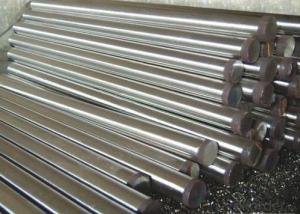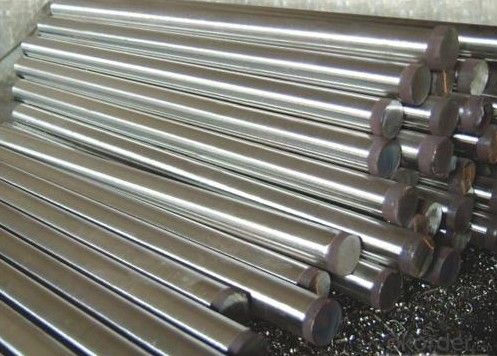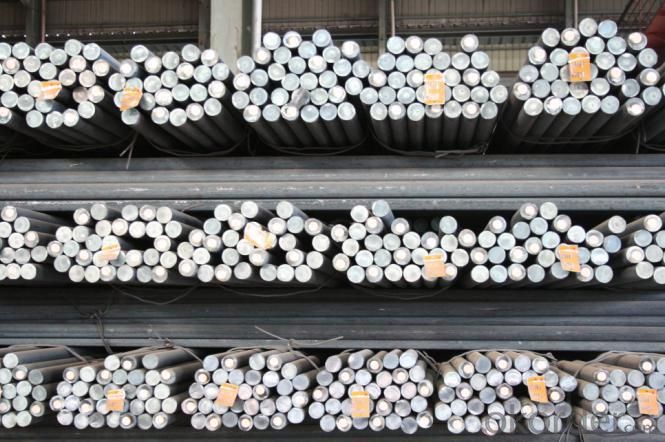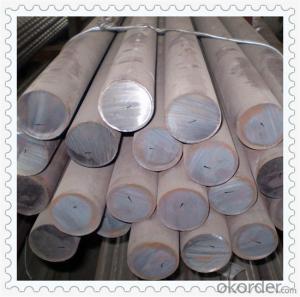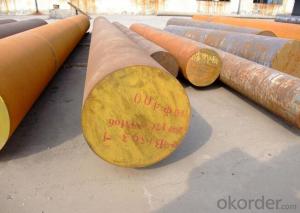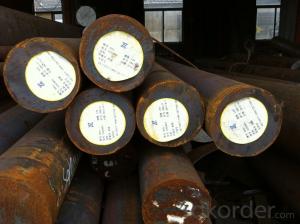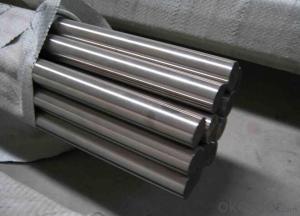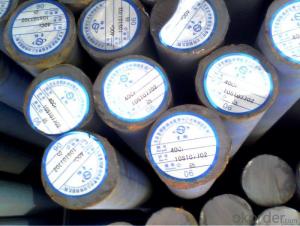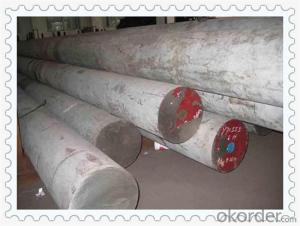Special Steel Alloy Steel Round Bar 41Cr4
- Loading Port:
- China main port
- Payment Terms:
- TT OR LC
- Min Order Qty:
- 30 m.t.
- Supply Capability:
- 10000 m.t./month
OKorder Service Pledge
OKorder Financial Service
You Might Also Like
Specification
Product Information
1 Grade Comparison:
GB | AISI | JIS | DIN |
40Cr | AISI/SAE5140 | SCr440 | 41Cr4 |
2 Chemical Composition:
C | Si | Mn | P | S | Cr | Ni | Cu |
0.38-0.43 | 0.15-0.35 | 0.60-0.90 | ≤0.03 | ≤0.03 | 0.3-0.16 | ≤0.25 | ≤0.03 |
3 Brief Introduction:
Dimension | 13-350mm |
Length | 2-13m or as per your request |
Delivery condition | Hot rolled |
Heat Treatment | Normalizing, Annealing, Quenching |
Packing | Standard seaworthy packing or according to your requirements |
4 Mechanical Property:
Yield Strength (MPa) | ≥785 |
Tensile Strength (MPa) | ≥980 |
Elongation (%) | ≥9 |
Hardness (HB) | ≤207 |
Reduction in Area (%) | ≥45 |
AKV (J) | ≥47 |
Product Show
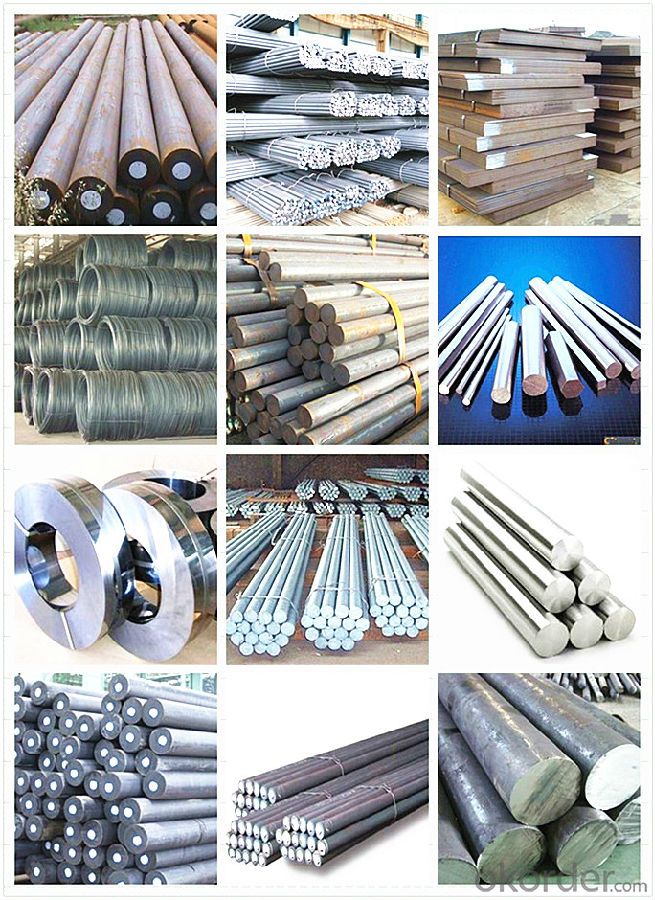
Workshop Show
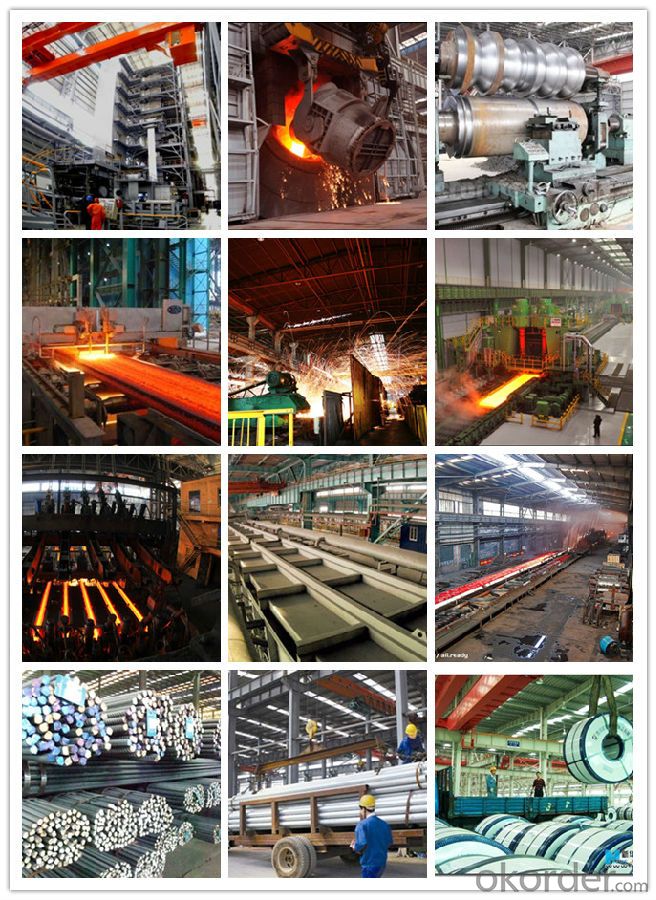
Shipping
1. FedEx/DHL/UPS/TNT for samples, Door-to-Door;
2. By Air or by Sea for batch goods, for FCL; Airport/ Port receiving;
3. Customers specifying freight forwarders or negotiable shipping methods!
Delivery Time: 3-7 days for samples; 5-25 days for batch goods.
Payment Terms
1.Payment: T/T, L/C, Western Union, MoneyGram,PayPal; 30% deposits; 70% balance before delivery.
2.MOQ: 1pcs
3.Warranty : 3 years
4.Package Informations: 1) EXPORT, In 20 feet (GW 25 ton) or 40 feet Container (GW 25 ton)
2)as customer's requirement
Why choose us?
(1) The leading exporter in China special steel industry.
(2) Large stocks for various sizes, fast delivery date.
(3) Good business relationship with China famous factories.
(4) More than 7 years steel exporting experience.
(5) Good after-sales service guarantee.
- Q: Can special steel be used for making mining equipment?
- Certainly, mining equipment can be manufactured using special steel. Special steel refers to steel alloys that have been specifically designed and produced to possess certain properties and characteristics that make them suitable for specific applications. In the case of mining equipment, special steel is commonly utilized due to its remarkable strength, toughness, and resistance to wear and corrosion. Mining equipment experiences extreme conditions, including heavy loads, impact, abrasion, and exposure to harsh environments. To ensure durability and performance under these demanding circumstances, special steel grades like high-strength low-alloy (HSLA) steel, tool steel, and wear-resistant steel are often employed in the manufacturing process. By utilizing special steel, mining equipment can withstand the stresses and strains encountered during excavation, hauling, and processing of minerals. It can be used to fabricate components such as bucket teeth, drill bits, cutting edges, and crusher parts that require resistance to wear and the ability to maintain strength even when exposed to abrasive materials. Furthermore, certain types of special steel, such as stainless steel, are especially suitable for mining operations where equipment comes into contact with corrosive substances like acids or moisture. Stainless steel exhibits excellent corrosion resistance, making it ideal for applications such as pipes, tanks, and conveyors used in mining operations. In conclusion, special steel is indeed a suitable choice for manufacturing mining equipment. Its superior strength, toughness, wear resistance, and corrosion resistance make it the preferred option for producing various components and structures used in the mining industry.
- Q: How does special steel perform in high-temperature environments?
- Special steel is specifically designed to perform well in high-temperature environments. It has excellent heat resistance, retaining its strength and hardness even at elevated temperatures. Special steel also exhibits good oxidation and corrosion resistance, reducing the risk of degradation or failure in high-temperature conditions. Overall, special steel is a reliable and durable material choice for applications requiring performance in high-temperature environments.
- Q: Can special steel be used for cutting tools?
- Yes, special steel can be used for cutting tools. Special steels, such as high-speed steel or tool steel, are specifically designed to have superior hardness, toughness, and wear resistance, making them ideal for manufacturing cutting tools that can withstand high temperatures and perform precision cutting operations.
- Q: What are the different applications of high-speed special steel?
- High-speed special steel has a wide range of applications in various industries. It is primarily used in the manufacturing of cutting tools, such as drills, milling cutters, and saw blades, due to its excellent hardness, toughness, and heat resistance properties. Additionally, it finds application in the production of high-speed bearings, gears, and springs in automotive and aerospace industries. High-speed special steel is also utilized in the construction of turbine blades, dies, and molds for the manufacturing sector. Overall, its exceptional performance characteristics make it an indispensable material for achieving precision and efficiency in numerous industrial applications.
- Q: What are the safety benefits of using special steel?
- Using special steel can provide several safety benefits in various applications. One of the main advantages is its enhanced strength and durability compared to traditional steel. Special steel is often designed to withstand extreme conditions, such as high temperatures or corrosive environments, making it ideal for applications in industries like aerospace, automotive, and oil and gas. The high strength of special steel allows for the construction of safer and more reliable structures. It can withstand heavy loads, reducing the risk of structural failures or collapses. This is crucial in industries where the safety of workers, equipment, and the general public is of utmost importance. Another safety benefit of special steel is its resistance to corrosion. Corrosion can weaken structures and compromise their safety. Special steel is often alloyed with elements like chromium, nickel, or molybdenum, which provide excellent corrosion resistance. This makes it suitable for applications in marine environments, chemical processing plants, or any setting where exposure to moisture or chemicals is a concern. Special steel is also known for its ability to retain its mechanical properties at high temperatures. This makes it an excellent choice for applications where heat resistance is crucial, such as in the construction of fire-resistant structures or in the manufacturing of industrial ovens and furnaces. By using special steel in these applications, the risk of structural failure or fire-related accidents can be significantly reduced. Furthermore, special steel can offer improved fatigue resistance, which is important in applications subject to cyclic loading or vibration. Fatigue failure can occur when a material experiences repeated stress over time, leading to cracks and eventual failure. Special steel can be engineered to have excellent fatigue properties, reducing the likelihood of unexpected failures and improving the overall safety of structures or equipment. In summary, the safety benefits of using special steel include enhanced strength, durability, corrosion resistance, heat resistance, and fatigue resistance. These properties make special steel a reliable choice for industries where safety is a top priority, ensuring the protection of workers, equipment, and the general public.
- Q: What are the different methods of surface polishing for special steel?
- There are several methods of surface polishing for special steel, each with its own advantages and applications. Some of the commonly used methods include mechanical polishing, electrochemical polishing, and chemical polishing. 1. Mechanical Polishing: This method involves the use of abrasive materials to remove surface imperfections and create a smooth and reflective surface. It can be done manually or using automated polishing machines. Mechanical polishing is effective for removing scratches, dents, and other surface defects. It is commonly used in industries such as automotive, aerospace, and precision engineering. 2. Electrochemical Polishing: Also known as electrolytic polishing, this method uses an electrolyte solution and an electric current to dissolve and remove surface material. Electrochemical polishing can provide a high level of surface smoothness and can be particularly useful for complex shapes and hard-to-reach areas. It is commonly used in industries such as medical devices, semiconductors, and jewelry manufacturing. 3. Chemical Polishing: This method involves the use of chemical solutions to selectively remove surface material and create a smooth finish. Chemical polishing is effective for removing oxide layers, stains, and contaminants. It is often used for stainless steel and other corrosion-resistant alloys. The process involves immersing the steel in a chemical bath and controlling factors such as temperature, concentration, and time to achieve the desired surface finish. 4. Electropolishing: Electropolishing is an electrochemical process that combines the benefits of electrochemical and chemical polishing. It involves the application of an electric current to remove surface material while simultaneously dissolving it in an electrolyte solution. Electropolishing can provide a highly smooth, clean, and corrosion-resistant surface finish. It is commonly used for stainless steel and other alloys in industries such as pharmaceutical, food processing, and semiconductor manufacturing. 5. Vibratory Polishing: This method utilizes vibrating media, such as ceramic chips or abrasive pellets, along with a polishing compound to remove surface imperfections. The steel parts are placed in a vibratory tumbler or bowl where the continuous movement causes the media to rub against the parts, resulting in a polished surface. Vibratory polishing is commonly used for small or delicate parts and can be an efficient and cost-effective method. Overall, the choice of surface polishing method for special steel depends on factors such as the desired surface finish, part geometry, material properties, and industry requirements. It is important to consider these factors and consult with experts or specialists to determine the most suitable method for a specific application.
- Q: How is nitriding steel used in surface hardening processes?
- Nitriding steel is used in surface hardening processes by introducing nitrogen into the surface layer of the steel through a controlled heat treatment. This process enhances the hardness, wear resistance, and fatigue strength of the steel, making it more durable and suitable for applications that require high surface hardness and improved performance.
- Q: How does special steel contribute to reducing product maintenance requirements?
- Special steel contributes to reducing product maintenance requirements by offering superior strength, durability, and resistance to corrosion and wear. This means that products made with special steel are less likely to break, degrade, or require frequent repairs or replacements. Its high-quality properties enable longer product lifespans and enhanced performance, ultimately minimizing maintenance efforts and costs for users.
- Q: What are the different testing methods for special steel?
- There are various testing methods for special steel, including hardness testing, tensile testing, impact testing, metallographic testing, and non-destructive testing. Each method helps assess different properties of the steel, such as strength, toughness, microstructure, and defects, ensuring its quality and suitability for specific applications.
- Q: What are the different corrosion-resistant special steel alloys?
- There are several corrosion-resistant special steel alloys that are commonly used in various industries. Some of the most popular ones include stainless steel, duplex stainless steel, super duplex stainless steel, and nickel-based alloys. Stainless steel is a widely used corrosion-resistant alloy that contains a minimum of 10.5% chromium. It forms a protective layer of chromium oxide on its surface, preventing further corrosion. Stainless steel is highly resistant to rust, staining, and pitting, making it suitable for applications in the food processing, chemical, and marine industries. Duplex stainless steel is a combination of both austenitic and ferritic stainless steels. It offers excellent resistance to corrosion, particularly in environments with high chloride ion concentrations. Duplex stainless steel is commonly used in the oil and gas, chemical, and desalination industries. Super duplex stainless steel is a higher strength version of duplex stainless steel. It offers enhanced corrosion resistance and mechanical properties, making it ideal for applications in harsh environments such as offshore oil and gas platforms, chemical processing plants, and seawater desalination systems. Nickel-based alloys, such as Inconel and Hastelloy, are known for their exceptional resistance to corrosion and high-temperature environments. These alloys are commonly used in industries such as aerospace, chemical processing, and power generation, where resistance to both corrosion and heat is critical. These corrosion-resistant special steel alloys provide various options for industries that require materials with excellent durability and resistance to corrosive environments. The choice of alloy depends on the specific application, operating conditions, and desired performance characteristics.
Send your message to us
Special Steel Alloy Steel Round Bar 41Cr4
- Loading Port:
- China main port
- Payment Terms:
- TT OR LC
- Min Order Qty:
- 30 m.t.
- Supply Capability:
- 10000 m.t./month
OKorder Service Pledge
OKorder Financial Service
Similar products
Hot products
Hot Searches
Related keywords
